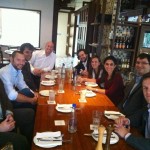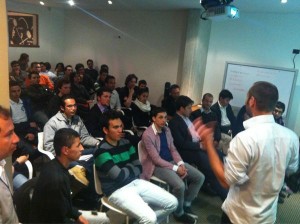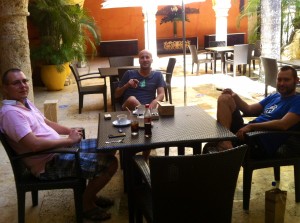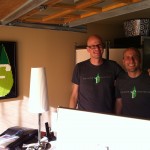 A few days ago, I received and interesting Tweet from @EndeavorCol asking my opinion on the question of how to find a good mentor for your startup. Even though it’s 4am and wisdom should dictate that I get the point forthwith, I’m going to take a step back and give my general thoughts on mentors, startups and founders (mostly in the tech space). I don’t usually make it a point to beat around the bush, but I feel the subject warrants a broader conversation before jumping into the topic of how to actually find a good mentor.
A few days ago, I received and interesting Tweet from @EndeavorCol asking my opinion on the question of how to find a good mentor for your startup. Even though it’s 4am and wisdom should dictate that I get the point forthwith, I’m going to take a step back and give my general thoughts on mentors, startups and founders (mostly in the tech space). I don’t usually make it a point to beat around the bush, but I feel the subject warrants a broader conversation before jumping into the topic of how to actually find a good mentor.
Because of what I do, I have occasion to actually mentor startups. Each year, I probably listen to over a hundred business ideas (usually for startups) or pitches of ongoing startups. After listening to these, I normally communicate my thoughts, which sometimes include my suggestions to the entrepreneur. It’s up to the entrepreneur whether they’d like to take this advice or not.
Many entrepreneurs are surprised when I convey my philosophy on the importance of mentors (such as myself). What I truly believe (and what I tell some) is that their best mentor is the customer. In other words, actually testing things out finding out what a customer is willing to pay for (or what a user is willing to spend time on). After this, comes the vision (whether evolving or coalescing) of the CEO and the founding team and third comes listening to mentors.
I’m not saying that mentors can’t and don’t make a big difference. In fact, I’ve seen first hand when entrepreneurs who have taken my own advice have translated it into incredible business results and/or million dollar fundraising success (other times, my advice was better left unheeded, but I won’t mention such instances). Don’t tell anyone, but I’m sometimes surprised by these results. What I’m saying is that I truly believe that, if you have a strong team that knows how to test things in the marketplace and a solid leader with an inspiring vision for the company, that foundation will greatly increase the possibilities of a company’s ability to follow through on good advice.
As a recent Business Insider article highlighted, most of the technology visionaries we can think of had one or more mentors which helped them along the way. Nonetheless, even if the right mentor comes along, many entrepreneurs are just not ready to be mentored. In Colombia, a lot has changed in the past two years (many international mentors have visited the country) and I’ve seen the following: 1. A few impressive entrepreneurs who are both good at executing and good at listening and processing advice (these are the most fun to be around); 2. Entrepreneurs who have become addicted to interacting with “celebrity” mentors without building the aforementioned foundation and are immune to advice from “mere mortal” mentors (their prospects are clearly limited); 3. Rudderless founders who get confused with advice from so many mentors and are ill equipped at translating it into directed action and finally, 4. Entrepreneurs who have built a successful, growing business and are pretty good at distinguishing insightful advice from superficial suggestions. These last ones are the self-assured, talented entrepreneurs, some of whom, could build high impact businesses, but in Colombia, are, for the most part, building lifestyle businesses.
Now, on the question of what makes a good mentor, some speak of the necessity of finding a mentor that has built at least one successful company. An example of this might be Adeo Ressi (next to me in the picture above – he’s the tall one), whom I’d like to consider a mentor of mine. Adeo has started eight businesses with some successes and some failures. Aside from that, thanks to the volume of deals he looks at, he’s developed the analytical skills similar to those of a prolific investor. Amazingly enough, Mark Suster just wrote a great post on the subject not only of mentors, but all of the people behind the scenes who help entrepreneurs.
I’m wary of absolutes (e.g., all mentors should be successful entrepreneurs) in such an exploratory endeavor as building startups. There is no doubt that former founders have a ton more street cred (and rightly so). However, if this were a steadfast requirement, impressive individuals such as Keith Rabois, who has never founded a successful startup (though he’s worked for the best) wouldn’t be in consideration, yet, he is one of the most prolific investors and sought after mentors in the valley. Perhaps I’m rationalizing since, I have been an investor, but am just now building an eCommerce company (SuperTrendi). 
Speaking from the mentor perspective, choosing to mentor a company, sit on its board and/or be an official advisor has as much to do with chemistry with the CEO and team as it does with my opinion of the teams general performance. Again, for me, the actual industry is my last consideration since one of the companies that I’m most excited about, and for which I am a shareholder and adviser (Mapache Studios), works in a space where I have limited knowledge (gaming and learning). However, the reason I get such a kick out of mentoring them is that 1. I admire the CEO and CTO and 2. They’ve built a talented team that executes.
Not all mentors serve the same function, though. Some mentors are subject matter experts (e.g., technology, industry) and some mentors help with business development. Also, some of the best mentoring sessions I’ve seen (mine included) have been short and, some would say, harsh. When done with the right intentions a pointed no-nonsense question can be more effective than hours of sweet-coated office hours.
So, how DO you find a good mentor for your startup? My first suggestion is to get as far as you can in building an exciting startup so that you can attract the type of mentor (and talent) you want. If you are, indeed, able to build something exciting (e.g., growing fast, solid team, etc.), you’ll have a much easier time attracting the quality mentor or mentors you need. Most entrepreneurs in Latin America that I’ve come across don’t have a good understanding to of the mentor or mentors they need. I’ve seen great advice be squandered by founders because it didn’t come from a “celebrity mentor.”
Once you have these elements in place, you can find mentors at networking and other events (e.g., Startup Weekend), local incubators and, even by reaching out on the Internet and having remote conversations. Another option is to take a trip to Silicon Valley. I think you’d be hard pressed to not find a contact in your Linkedin Network that can help you start making contacts in Silicon Valley in order to get the first few meetings going. You’d be surprised how accessible people can be.
So, to recap: 1. Do as much as you can to build an impressive startup team, traction and growth. 2. Have some idea of the types of mentors you most need (not to discard mentors who may be excited with what you’re doing, but to have some idea of where your challenges lay). 3. Start networking locally and internationally.
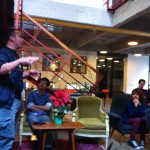 Well, it’s been quite a week. We kicked off the Socialatom Ventures startup program on Monday with 12 initial companies. Andres Barreto (co-founder of OnSwipe), one of my partners, has been here in Bogota and it’s been great for the startups getting his point of view on their individual startups. He’s not only got experience with his own startups, but has been contributing quite a bit to the Latin American ecosystem in general.
Well, it’s been quite a week. We kicked off the Socialatom Ventures startup program on Monday with 12 initial companies. Andres Barreto (co-founder of OnSwipe), one of my partners, has been here in Bogota and it’s been great for the startups getting his point of view on their individual startups. He’s not only got experience with his own startups, but has been contributing quite a bit to the Latin American ecosystem in general.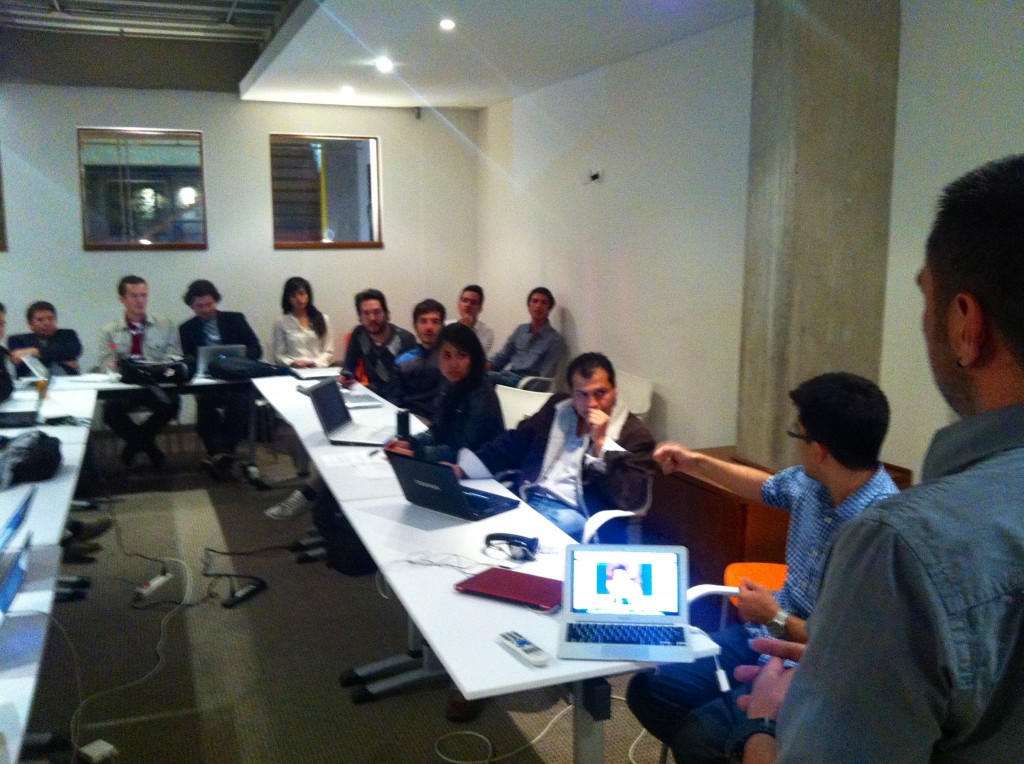 On Wednesday, we had our first status meeting at 10:10pm in the evening. We chose this date and time for the progress meeting for a number of reasons with one of these being that of inculcating the reality of startup culture into the founders. Each startup pitches and also provides status on milestones in order to make sure they are learning and progressing.
On Wednesday, we had our first status meeting at 10:10pm in the evening. We chose this date and time for the progress meeting for a number of reasons with one of these being that of inculcating the reality of startup culture into the founders. Each startup pitches and also provides status on milestones in order to make sure they are learning and progressing.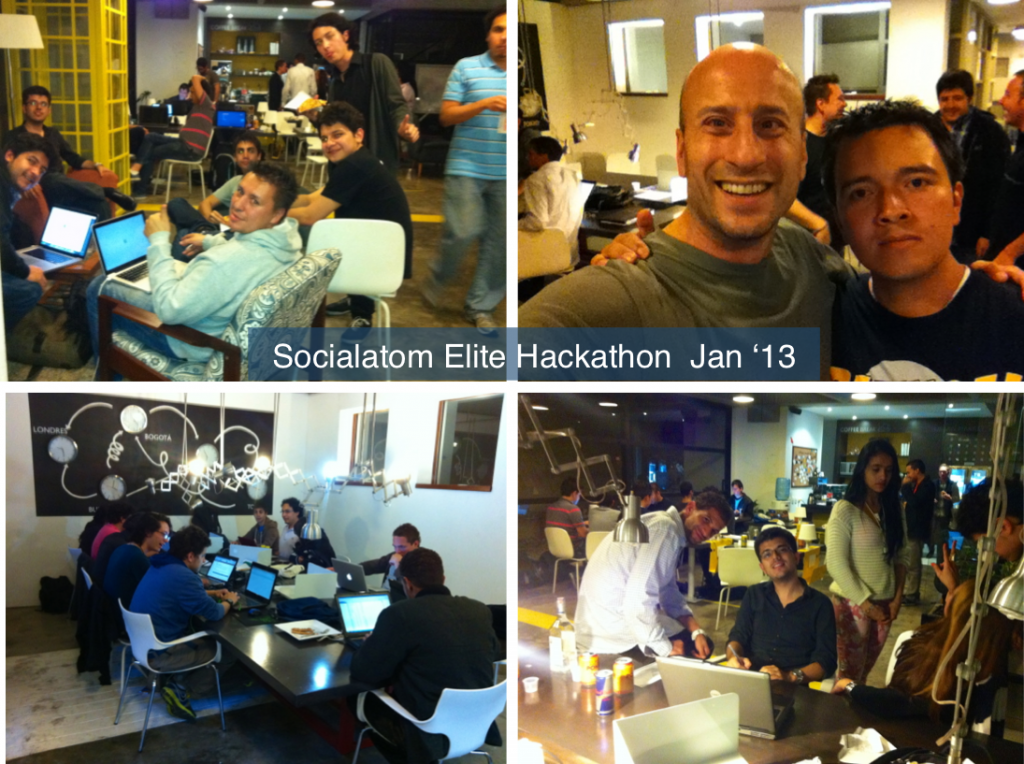 As if all of this wasn’t enough, it’s Sunday evening and I’m sitting here at Socialatom Ventures at a great Hackathon that Andres set up with some of our developers and host of other talented developers who were handpicked to participate. There are a number of interesting project such as a platform for asking mayors from different cities questions to a simple gifting app based on Facebook likes. In general, we’ve done everything we know to get these startups in the right frame of mind to accelerate their progress.
As if all of this wasn’t enough, it’s Sunday evening and I’m sitting here at Socialatom Ventures at a great Hackathon that Andres set up with some of our developers and host of other talented developers who were handpicked to participate. There are a number of interesting project such as a platform for asking mayors from different cities questions to a simple gifting app based on Facebook likes. In general, we’ve done everything we know to get these startups in the right frame of mind to accelerate their progress.



